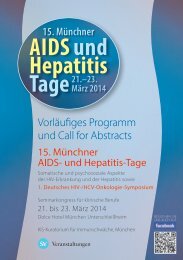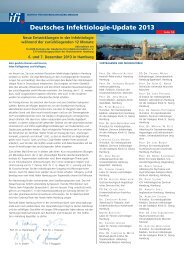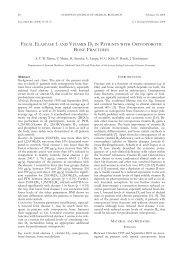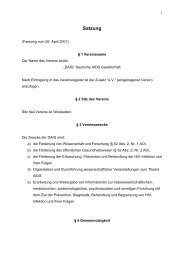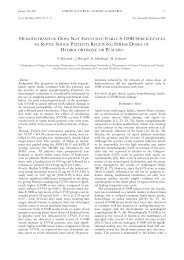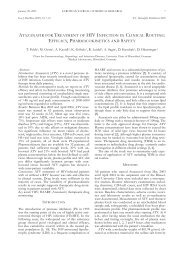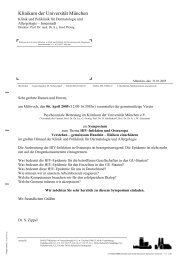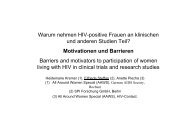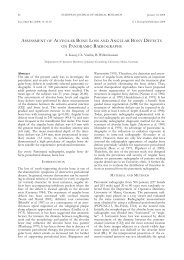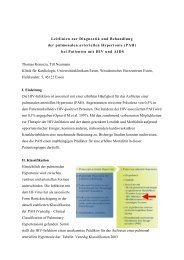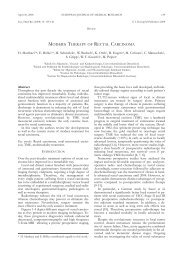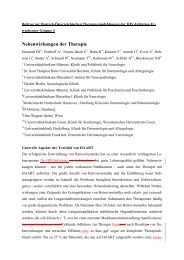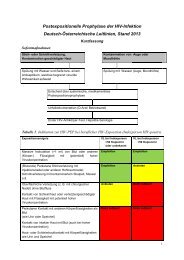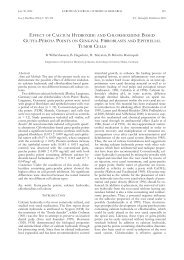European Journal of Medical Research - Deutsche AIDS ...
European Journal of Medical Research - Deutsche AIDS ...
European Journal of Medical Research - Deutsche AIDS ...
You also want an ePaper? Increase the reach of your titles
YUMPU automatically turns print PDFs into web optimized ePapers that Google loves.
June 27, 2007 EUROPEAN JOURNAL OF MEDICAL RESEARCH<br />
35<br />
population, aged 15-49 years, representing a number <strong>of</strong><br />
410,000 HIV-carriers (Estimate, UN<strong>AIDS</strong>/WHO 2006). The<br />
epidemic has evolved from a specialized problem <strong>of</strong> vulnerable<br />
groups (IDUs, men having sex with men, sex workers) to<br />
a generalised epidemic affecting all social ranks and ages.<br />
HIV/<strong>AIDS</strong> prevention campaigns in the Ukraine are insufficient.<br />
Social ignorance and stigmata are detectable towards<br />
people living with HIV/ <strong>AIDS</strong> (PLWAH).<br />
Methods: The first fact-finding tour took place in 2004. Contacts<br />
with Ukrainian students were established. In 2005 the<br />
Students Health Dialogue (SHD) signed a contract with the<br />
IFMSA Ukraine (International Federation <strong>of</strong> <strong>Medical</strong> Students<br />
Association) to build up and adopt HIV/<strong>AIDS</strong> prevention<br />
in the Ukraine. German and Ukrainian students developed<br />
the concept at the first German-Ukrainian peer-education<br />
conference at the University Witten/ Herdecke including<br />
a first 3-phase model and a peer-to-peer education program.<br />
Results: In a first step Ukrainian students who visited the<br />
conference trained 45 trainers from 5 different faculties in<br />
Kiev. The second phase included peer education training in<br />
schools and universities. Over 800 pupils and students could<br />
be educated in HIV/<strong>AIDS</strong> prevention until the end <strong>of</strong> December<br />
2006. In a third phase a group <strong>of</strong> 6 SHD-activists visited<br />
the local projects, took part in prevention courses and gathered<br />
facts about the prevention campaigning. Evaluation protocols<br />
<strong>of</strong> the former phases with the development and adoption<br />
<strong>of</strong> the HIV/<strong>AIDS</strong> prevention campaign in the Ukraine are<br />
in progress. A train-the-trainers workshop is planned in<br />
Charkiv in April 2007.<br />
Conclusions: Further faculties are invited to participate and<br />
more trainers are to be educated to generalise HIV/<strong>AIDS</strong> prevention<br />
campaigning by international student coalitions. Peerorganised<br />
prevention campaigns are a very important part <strong>of</strong><br />
sexual health education and availability should be widened.<br />
Further research on outcome, evaluation and cultural adoption<br />
should be done.<br />
A.25 (Poster)<br />
Empowerment in der HIV/STD Prävention durch<br />
Peer Education und Labeling am Beispiel von<br />
DARKANGEL im realen und virtuellen Raum<br />
de Witt R. 1<br />
1 manCheck Berlin, Projektleitung, Berlin, Germany<br />
Allgemein wird eine Tendenz zu mehr unsafem Sex bei Männern,<br />
die Sex mit Männern haben (MSM) festgestellt (so<br />
genannte „Kondommüdigkeit“).<br />
Erfolgreiche Primärprävention muss einen positiven<br />
Gegentrend setzen.<br />
Fragestellung: Führt die Einführung eines „Labels“ und<br />
eines Markennamen für „Safer Sex“ zu Empowerment bei der<br />
Zielgruppe?<br />
Methode: Projekt DARKANGEL<br />
Ziel: MSM, die Safer Sex praktizieren unterstützen und<br />
stärken. Sichtbar machen von Safer Sex Praktizierenden<br />
(Statement). Gegengewicht zum proklamierten Trend „unsafer<br />
Sex“.<br />
5 Phasen:<br />
1. Postkarten, T-Shirts, Leuchtsticker „Safe Tonight“, eigene<br />
„Crusing-Packs“ (Gleitgel und Kondom) werden produziert.<br />
Sowie ein „Vertrag“, den der zukünftige DARKANGEL ausfüllt.<br />
Inhalt: Ja, ich will DARKANGEL sein<br />
- Ich will den Safer Sex in der Szene stärken<br />
- Ich werde andere akzeptieren<br />
. auch wenn sie anderer Meinung sind<br />
. meine Überzeugungen nicht teilen<br />
. keine Gespräche wollen<br />
Nach Unterzeichnung erhält man „Cruising Packs“ und<br />
Sticker „Safe Tonight“. Die Leuchtsticker können beim<br />
„Cruisen“ (suche von sexuellen Kontakten), getragen werden.<br />
Aussage: „Mit mir nur Safer Sex“.<br />
2. gayromeo, ein Chatportal, wird für eine Zusammenarbeit<br />
gewonnen. Userpr<strong>of</strong>ile, einer Art Visitenkarte, können mit<br />
einem DARKANGEL Button versehen werden. Aussage:<br />
„Mit mir nur Safer Sex.“<br />
3. Internetseite www.DARKANGEL.eu<br />
- Möglichkeit der Online-Registrierung<br />
- Vertrag direkt abrufbar<br />
- wird online ausgefüllt und versandt<br />
- nach Reaktion auf eine Bestätigungsmail ist man DARKAN-<br />
GEL und bekommt sein „Starter Pack“(s.o.).<br />
4. DARKANGEL-Club bei gayromeo<br />
- Club News<br />
- Forum: Diskussionsmöglichkeit zu Safer Sex (peer-to-peer).<br />
5. Newsletter<br />
Ergebnis: Online-Label bei „gayromeo:<br />
- innerhalb eines Jahres über 85.000 Nutzer<br />
Online Registrierung auf www.DARKANGEL.eu - innerhalb<br />
eines Jahres mehr als 500 Mitglieder in der Live-Version<br />
DA Club:<br />
- 1.044 Mitglieder<br />
- Diskussionsforum, Themen Safer Sex, bareback etc.<br />
Der Newsletter - über 300. Fazit: Viele MSM, gerade Jüngere,<br />
haben einen Bedarf, „Safer Sex“ als Verhalten auszudrücken<br />
und einer zugehörigen Community. DARKANGEL<br />
erreicht so Empowerment für die 70% der MSM, die nach wie<br />
vor grundsätzlich Safer Sex wollen.<br />
A.26 (Poster)<br />
Lust or trust? Adolescents’ sexual risk behaviour –<br />
a project overview<br />
Brunner E. 1 , Brunner C. 1 , Kada O. 1 , Jenull-Schiefer B. 1<br />
1 Alpen-Adria-Universität Klagenfurt, Institut für Psychologie,<br />
Abteilung für Angewandte Psychologie und<br />
Methodenforschung, Klagenfurt, Austria<br />
Objective: Health psychology uses social cognitive models<br />
(Schwarzer, 2004) to explain risky behaviours such as defaulted<br />
condom use. These models emphasise the role <strong>of</strong> rationality<br />
in the decision for or against a condom. Emotional<br />
and interactive components are neglected. Sexuality is characterized<br />
by complex emotional events, usually experienced in a<br />
dyadic setting (Pant, 2005). Therefore the project “Lust or<br />
trust?” highlights emotions and interactive aspects like communication<br />
besides rational components.<br />
Methods: The project consists <strong>of</strong> six studies: Experts (n = 7)<br />
were interviewed regarding the preventive landscape and<br />
youth sex education in Austria. Using questionnaires adolescents<br />
were asked for their motives for and against condom use<br />
(N = 175) and for their emotional experiences regarding their<br />
first and last sexual intercourse (N = 144). Two interview<br />
studies were conducted – one, investigating girls’ emotional<br />
experiences before, during and after the first sexual intercourse<br />
(n = 32), and another exploring interactive components<br />
in casual sex encounters (n = 30). At last 1089 Carinthian<br />
adolescents were surveyed considering variables such as con-



